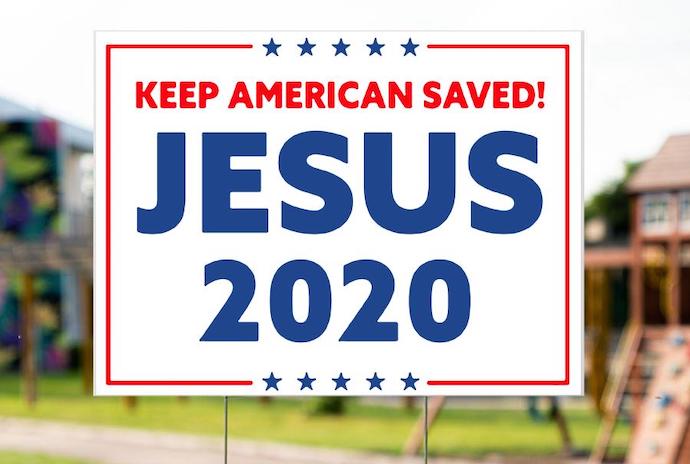As I noted previously here on RD, when it comes to covering American Christianity in general and conservative, mostly white evangelicals in particular, legacy media outlets like the New York Times and the Washington Post have recently begun to improve on their longstanding pattern of printing softball takes that “portrayed what is an essentially authoritarian religious and political demographic in an unduly positive light, whitewashing the centrality of white supremacism and patriarchy in evangelicalism.”
Such uncritical writing helps to normalize extremism, but, as the persistence of white evangelical Trump support eroded evangelicals’ control of their own narrative, more responsible coverage has emerged, coverage that treats exvangelicals and other people adversely affected by Christian Right politics as stakeholders in the discussion. Unfortunately, alongside the welcome emergence of fairer, more accurate reporting on evangelicalism, the same old patterns persist, for example in this New York Times piece that paints the opposition of many white evangelicals to getting vaccinated against COVID—an opposition driven by the decidedly unsympathetic motivations of fear-mongering conspiracy theories and resentment against othered groups—in an unduly sympathetic light.
More recently, Times guest opinion columnist Molly Worthen, an associate professor of history at the University of North Carolina at Chapel Hill, pulled out the tired old trope that evangelical young people are going to shift their faith communities away from their parents’ culture wars, a trope grounded in nothing but wishful thinking. In her op-ed, “Is There a Way to Dial Down the Political Hatred?”, Worthen also incorrectly portrays exvangelicals as “young Christians” who are “openly challenging their parents’ orthodoxies.”
Had Worthen done minimal due diligence on this matter by talking to someone who identifies with the term exvangelical, she would have learned that, while we share a common background, we don’t share a common metaphysics, but instead run the gamut from progressive Christian to Wiccan to spiritual-but-not-religious to agnostic and atheist, and everything in between. In fact, the Times article that Worthen’s comment on exvangelicals links to is a profile of a man who clearly identifies as an ex-Christian.
But Worthen’s apparent preference to talk about exvangelicals without talking to us—a preference shared by the evangelical leaders who are in a state of moral panic about the exvangelical phenomenon—is an outgrowth of a larger problem with her thinking about religion and society. Drawing on the Catholic communitarian philosopher Charles Taylor, Worthen offers a breezy assessment of America’s polarization as resulting from the “old spiritual cravings” that “we” are supposedly trying, and failing, to meet through politics, a problem that conveniently afflicts “both sides” of the American political spectrum, even though only one side incited a conspiracy-fueled, violent insurrection at the Capitol on January 6 in an attempt to overturn legitimate presidential election results.
Yes, Worthen addresses this fact briefly, but in a clearly perfunctory way, presumably as a preemption of criticism that conveniently allows her to return to focusing on what’s wrong with “both sides.” And “what’s wrong” is, apparently, a lack of outlets for “our” presumed “metaphysical needs,” a contention that makes no sense given that white evangelical Trump support has consistently correlated with frequent church attendance, to say nothing of the clearly evangelical prayers, Christian flags, and “Jesus 2020” banners that showed up at the January 6 insurrection.
Worthen writes, “Over the past six months Mr. Biden has been warning us, in his frank and ecumenical way, that Americans have become a bunch of idol worshipers. He’s right. We have transformed political hatreds into a form of idolatry.” And it is this contention that, paradoxically, seems to drive Worthen’s apparent need to “save” conservative Christians by portraying them in an unrealistically rosy light.
According to Worthen, the proliferation of “pseudoreligious ideologies and purity cults… on both ends of the political spectrum” represents “a commentary not just on the polarization of politics but also on the persistence of humans’ metaphysical needs,” a sweeping assertion for which she provides no convincing evidence. Indeed, Worthen begs the question, apparently taking the point to be self-evident in light of our political polarization. Putting aside the issue of “metaphysical needs” for a moment, it is true that political fervor and dogmatism often do resemble the zeal of fundamentalist religion.
But, while Worthen is far from the first to suggest that secularization results in political disaster via the channeling of religious impulses into politics, it’s a leap to suggest that all we need is something like more religion, or “authentic” religion, or other ways of meeting our supposed “metaphysical needs,” in order to reduce political polarization. Of course, the premise itself, that the channeling of religious drives into politics is at the root of American polarization, is a misdiagnosis of the problem, just as the suggestion that white evangelicals’ politics represents a “corruption” of their understanding and practice of their faith, rather than an outgrowth of Christianity as they interpret it, is demonstrably false.
Given her fixation on metaphysics, it is perhaps unsurprising that Worthen’s analysis of what ails America is entirely lacking in discussion of power differentials and structural considerations. Racism only makes a cameo, serving as a backdrop to showcase Protestant-Catholic cooperation in the Civil Rights Movement. Of course, this conveniently deflects from the more enduring vehicle for political cooperation between Catholics and (mostly white) evangelicals to which we owe our current hard-right Supreme Court: anti-choice politics.
Meanwhile, to provide an example of how Americans might bridge political divides by learning to listen, Worthen refers to an experiment that brought students from Spring Arbor University, a Free Methodist school, and Oberlin College, a secular liberal arts school, together for an intensive experience of learning and dialogue. But how much does it really prove to get privileged college students who can afford to study in private institutions but tend to have opposing political leanings to find common ground and engage in respectful dialogue?
To bring Worthen’s concern with polarization down to earth, multiple academic disciplines and approaches have established a causal link between wealth inequality and economic decline in a society on the one hand, and polarization and a decline in trust on the other. If Americans need to be able to find meaningful communal engagement—and with that much I agree—then we need to be able to afford our lives without running ourselves ragged working multiple dead-end jobs with no realistic prospects for getting out of debt.
We need to be able to afford healthcare, childcare, and housing without undue stress, and it wouldn’t hurt to have a universal basic income. And if we want to be able to have these things, then we have to find ways to deal with the structures in our politics that continue to provide disproportionate power to the wealthy and to white men and white Christians. Gerrymandering, voter suppression, the fundamentally unfair nature of the Electoral College, and unfair Senate representation—the factors that allow the white, male, Christian minority to impose its will on the rest of us—need to be addressed.
Of course, these massive structural problems cannot be solved with what amounts to little more than “the power of positive thinking” or with any number of programs that bring people together for dialogue across political and religious divides. These problems don’t have convenient “spiritual” solutions.
For a set of highly privileged Americans, I can understand why Worthen’s prescriptions might hold a certain attraction. But whatever one’s attitude to metaphysics and religion, it’s necessary to face the truth that America’s problems will not be solved with mysticism. To argue otherwise is not only, at best, misguided; it also does Americans a great disservice by asking us, essentially, to channel our limited energy into fruitless efforts that leave untouched the oppressive economic and political structures at the root of our societal discontent.





